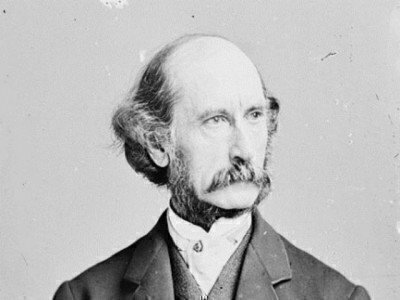[ad_1]
On April 15, 1865, President Abraham Lincoln died from his murderer’s wounds. But when John Wilkes Sales space’s plot had been fully profitable, a little-known Senator could have been thrust into the White Home.
 Sales space’s full plot included killing Lincoln, Vice President Andrew Johnson, and Secretary of State William Seward. Common Ulysses Grant was one other doable goal. However solely two assaults befell on April 14, 1865, with Seward surviving an assassination try and Lincoln dying from Sales space’s single gunshot.
Sales space’s full plot included killing Lincoln, Vice President Andrew Johnson, and Secretary of State William Seward. Common Ulysses Grant was one other doable goal. However solely two assaults befell on April 14, 1865, with Seward surviving an assassination try and Lincoln dying from Sales space’s single gunshot.
In keeping with the foundations of presidential succession in 1865, solely Vice President Johnson, and never Seward or Grant, was in line to exchange Lincoln if he died. If Johnson had died, an appearing President could be appointed till a particular election might be held to elect a brand new President (and never a Vice President).
The appearing President would have been the president professional tempore of the Senate, Lafayette Sabine Foster of Connecticut.
The Presidential Succession Act of 1792 managed how the President was changed if he died in workplace, stop, or was unable to carry out his duties.
The act was modified in 1886 and 1947 to cope with completely different situations. The twentieth Modification addressed what occurs if a president-elect can’t take workplace, and the twenty fifth Modification cleared up the succession of a brand new Vice President and what occurs when a president is quickly unable to carry out his or her duties.
Again in 1865, Sales space had satisfied George Atzerodt, an acquaintance, to kill Johnson by setting a entice on the Kirkwood Home lodge the place the vice chairman lived. Nevertheless, Atzerodt misplaced his nerve and didn’t try and kill the Vice President, despite the fact that he had a rented room above Johnson’s and a loaded gun was discovered within the room.
If Atzerodt or one other assailant had succeeded, Senator Foster would have been appearing President till March 4, 1866. And if Foster weren’t obtainable, Speaker of the Home Schuyler Colfax would have been subsequent, and final, in line to succeed Lincoln and Johnson.
A particular election would have taken place in November 1865, with the Electoral Faculty convening in December 1865, and the presidential inauguration being held on March 4, 1866.
The individual charged with the official notification of the states to start out the particular election course of was the secretary of state. Fortunately, William Seward survived an assault by murderer Lewis Powell.
If Seward had died, that energy could have devolved on the assistant secretary of state, who may carry out the duties as an appearing secretary of state till a brand new President named a alternative who was confirmed by the Senate.
The assistant secretary of state on April 15, 1865, was Frederick W. Seward, the son of William Seward. Frederick Seward was additionally severely injured defending his father throughout Powell’s assassination try. (He would recuperate after Powell pistol-whipped him.)
From what we learn about Lafayette Sabine Foster, he was a conservative Republican who was named because the president professional tempore of the Senate a few month earlier than Lincoln’s dying. Foster solely remained within the Senate for an additional two years, failing in a re-election try. He was later a decide in his dwelling state till his dying in 1880.
In keeping with his obituary, Foster was “a distinguished determine in congressional life, as a transparent and forcible debater upon nice public questions, and as an unsurpassed presiding officer within the Senate, that he was most generally identified and shall be greatest remembered.”
Foster additionally was cited for being above the politics that led to his Senate defeat in 1866.
“He was no seeker after recognition, definitely he by no means descended to any truckling arts to safe it, and doubtless to some extent he misplaced favor by the excessive tone of each his character and bearing, and by the selectness of his friendships,” the obituary stated.
A New York Instances article from 1875 sheds some extra gentle on Foster’s lack of his Senate seat. The Republicans picked one other nominee at a caucus in 1866, and Foster signaled his settlement to run as a rival candidate supported by Connecticut’s Democrats. Foster dropped out on the final second to simply accept a decide’s place within the state.
The Instances article stated Foster remained bitter about shedding his Senate seat.
“He doesn’t seem like have ever recovered from the frustration of his defeat in 1866,” the article acknowledged.
And what would have occurred within the particular presidential election of November 1865? The Republican Celebration was already break up between its Radical and Reasonable wings.
Common Grant could have run for president as a compromise candidate, however different distinguished Republicans included Seward, Colfax, Thaddeus Stevens, and Benjamin Wade.
The Democrats had been additionally divided and had been badly crushed within the 1864 presidential marketing campaign. Former New York Governor Horatio Seymour, the eventual 1868 nominee, was a key participant within the social gathering, as was George H. Pendleton, the 1864 vice presidential nominee. Common Winfield Scott Hancock had presidential ambitions in later years, and he had personally supervised the executions within the Lincoln assassination case.
The previous Accomplice states wouldn’t have been concerned since they weren’t readmitted to the union.
Benjamin Wade changed Foster as Senate president professional tempore in 1867 and almost grew to become appearing President in 1868 when President Johnson averted elimination from workplace by one vote in a Senate trial.
Scott Bomboy is the editor-in-chief of the Nationwide Structure Heart
[ad_2]
Source link




